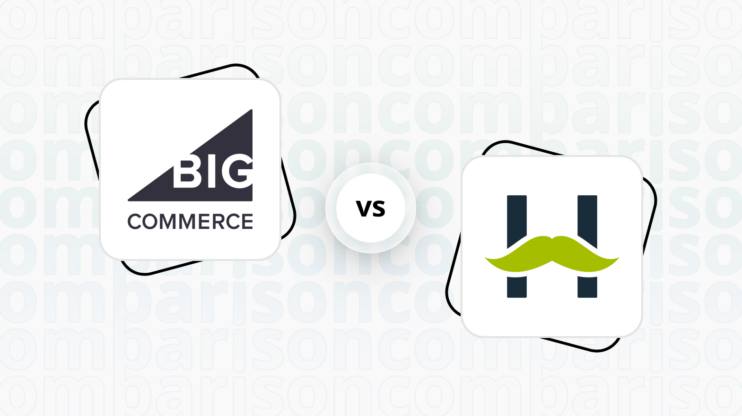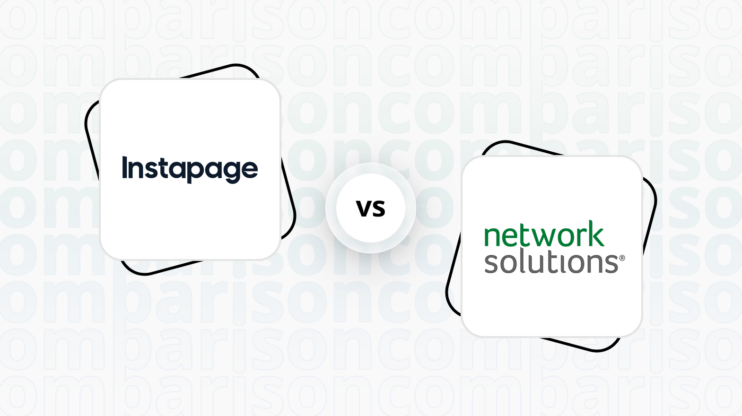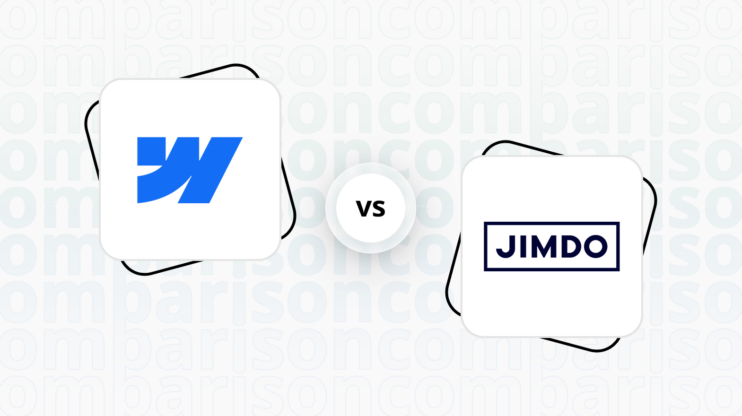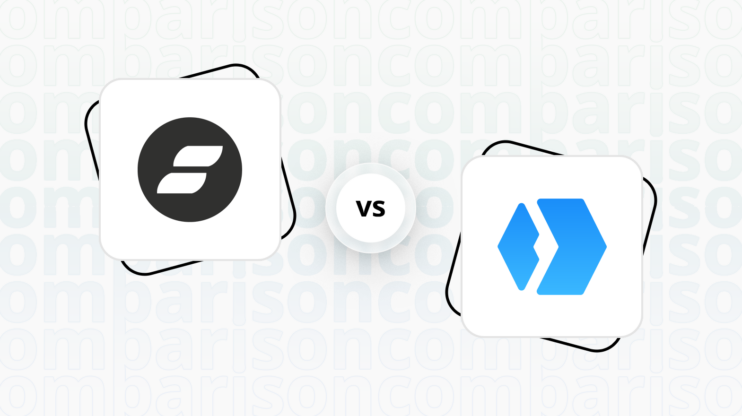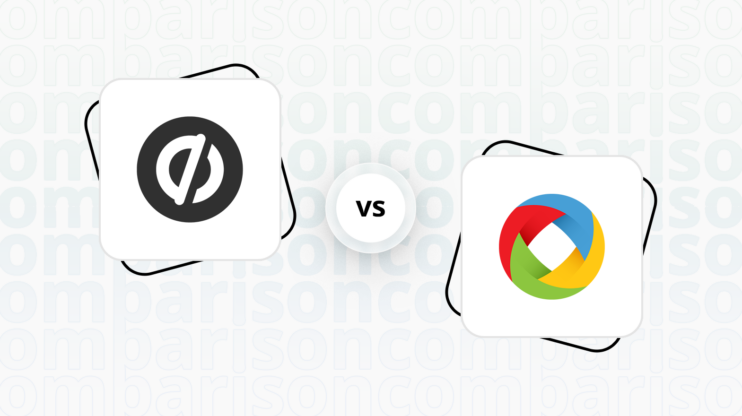Final verdict
Google Sites vs Yola both offer unique advantages, but they cater to different user needs and preferences.
-
Google Sites (Overall Grade: 5.6/10)
is ideal for users seeking a simple, collaborative platform for creating basic websites. It excels in ease of use, integration with Google services, and robust security features. However, it lacks advanced ecommerce capabilities and extensive design customization options, making it more suitable for personal projects, team collaborations, and small business websites that do not require complex functionalities. -
Yola (Overall Grade: 6.5/10)
stands out for its diverse range of templates, ecommerce capabilities, and comprehensive marketing tools. It offers a user-friendly interface with more design flexibility and customization options compared to Google Sites. Yola is a better choice for small businesses and individuals looking to create professional-looking websites with ecommerce functionalities and advanced marketing features.

|

|
|
|---|---|---|
|
Design functionalities & templates |
4.9 |
7.2 |
|
Ease of use |
8.3 |
8.0 |
|
Ecommerce |
1.8 |
5.7 |
|
Website editors |
7.0 |
6.7 |
|
Product testing options |
6.9 |
7.5 |
|
Price |
8.1 |
8.1 |
|
Hosting quality |
8.2 |
7.2 |
|
Website speed optimization |
3.3 |
7.5 |
|
Plugins/extensions and integrations |
6.4 |
6.3 |
|
Marketing features |
2.6 |
6.5 |
|
Customer support |
7.2 |
6.3 |
|
Website security |
9.3 |
8.3 |
|
AI capabilities |
0 |
0.0 |
|
User management |
7.8 |
7.3 |
Best for ecommerce
 1.8
1.8
 5.7
5.7
Verdict
: Yola is a more suitable choice for ecommerce compared to Google Sites, offering a range of ecommerce features and integrations that Google Sites lacks.
-
Google Sites
: Google Sites is not designed for ecommerce. It lacks built-in ecommerce features and primarily serves as a tool for creating simple websites. Users can integrate third-party tools or widgets for ecommerce functionalities, but this requires additional effort and may not provide a seamless experience. When comparing Google Sites vs Yola, Google Sites falls short in ecommerce capabilities. -
Yola
: Yola offers a more comprehensive ecommerce solution through its integration with Ecwid. It supports various payment gateways, product page customization, and additional ecommerce features such as shipping and tax configurations, product catalog management, and analytics. This makes Yola a better choice for small businesses looking to sell products online.
Best for informational & business websites
 7.2
7.2
 7.4
7.4
Verdict
: When it comes to creating informational and business websites, Yola slightly edges out Google Sites with a score of 7.4 compared to Google Sites’ 7.2. Both platforms offer user-friendly interfaces and robust features, but Yola’s diverse range of templates and customization options make it a more versatile choice for business websites.
-
Google Sites
: Google Sites is an excellent choice for users who need a simple, collaborative platform to create informational websites. Its integration with other Google services and ease of use make it ideal for team projects and small business websites. However, it offers fewer design customization options compared to Yola, which might limit its appeal for businesses looking for more creative control. -
Yola
: Yola stands out with its wide range of customizable templates and user-friendly drag-and-drop interface. It provides a comprehensive solution for individuals and small businesses to create professional-looking websites without advanced technical skills. Yola’s additional features, such as SEO tools and e-commerce capabilities, make it a versatile platform for managing an online presence. When comparing Google Sites vs Yola, Yola’s flexibility and design options make it a better choice for business websites.
Detailed comparison
Design functionalities & templates
Design FunctionalitiesRepresents how well each platform allows for creative design and customization of websites.Score Components:
- Template Variety (30%): Range and quality of design templates.
- Customization (30%): Flexibility and options for design alterations.
- User Interface (20%): Ease and intuitiveness of the design process.
- Responsiveness (10%): Adaptability to different devices and screen sizes.
- Innovation (10%): Unique design features and tools.
 4.9
4.9
 7.2
7.2
🏆
Winner: Yola.
Yola offers a more diverse range of templates and designs, extensive customization flexibility, and a wider range of creative design possibilities compared to Google Sites.
Google Sites offers a limited number of templates suitable for various purposes, from personal blogs to business websites. These templates are designed for user engagement, simplicity, and functionality, allowing for customization to meet specific needs. However, compared to other website builders, Google Sites might offer less variety in templates and design customization options.
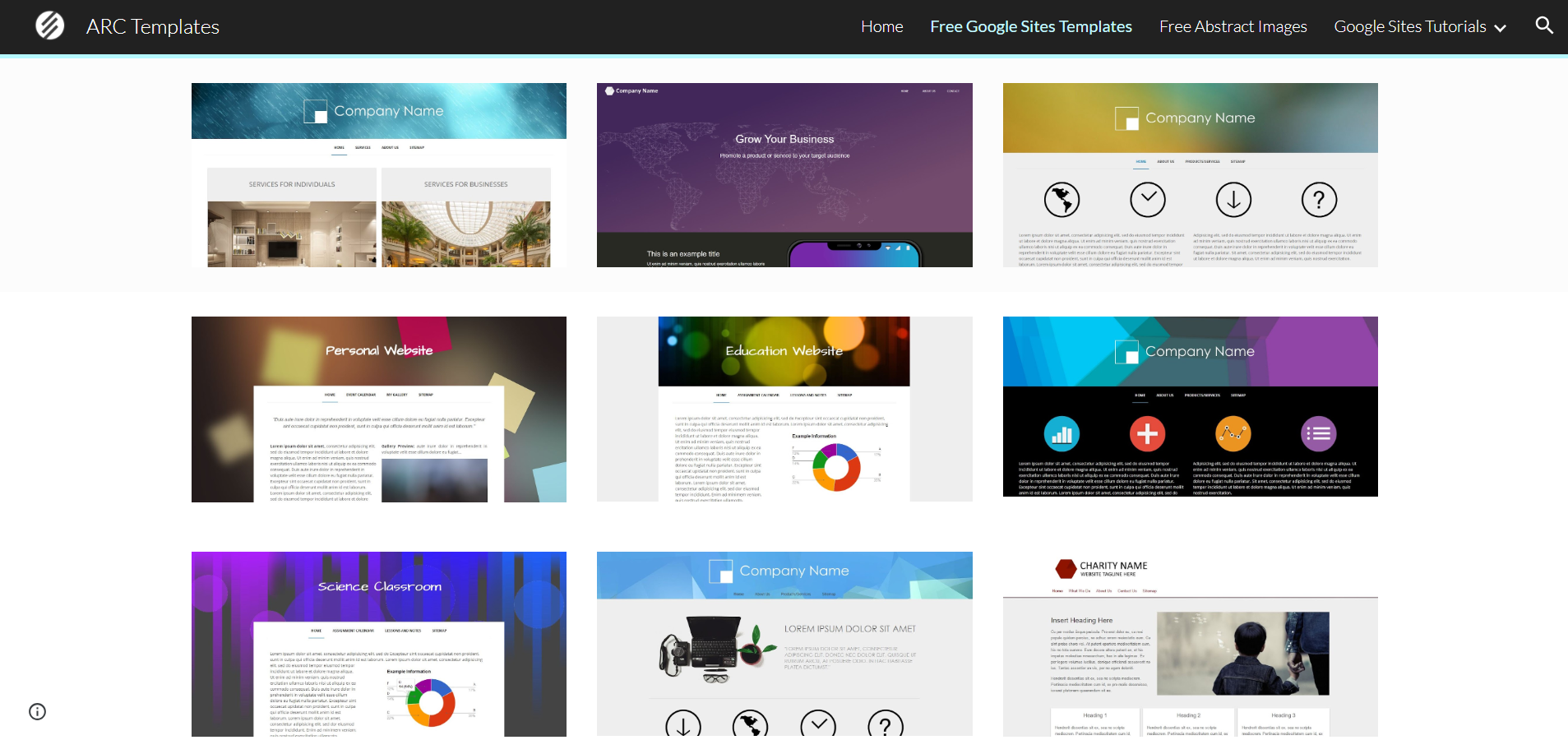

On the other hand, Yola offers a diverse range of templates and designs, catering to various types of websites, from personal blogs to professional business sites. Users can choose from a wide selection of themes, each customizable to fit their specific needs and preferences. With hundreds of templates available, Yola ensures that there is something for everyone, regardless of their niche or industry.


Get a head start on website creation with AI
Create a custom website tailored to your business needs 10X faster with 10Web AI Website Builder!
Ease of use
Ease of useReflects the platform’s overall user-friendliness.Score
Components:
- Learning curve (40%): Quickness and ease of getting started.
- Interface design (30%): Simplicity and intuitiveness of layout.
- User guidance (20%): Quality of tutorials and support.
- Flexibility (10%): Adaptability to various user skills.
 8.3
8.3
 8.0
8.0
🏆 Winner: Google Sites
. Scoring 8.3, Google Sites offers a user-friendly interface that allows individuals with no coding experience to create and publish websites easily. Yola, with a score of 8.0, also offers a robust platform but with a slightly lower score. If ease of use is a priority, Google Sites is the clear winner in this category.
Learning Resources
🏆 Winner: Google Sites
. While both platforms offer solid learning resources, Google Sites goes a step further with its wide array of practical guides and comprehensive digital skill development programs, making it easier for users to learn and adapt.
For ecommerce
EcommerceMeasures the platform’s effectiveness in supporting online business activities.Score Components:
- Ecommerce themes and templates (20%): Variety and design of templates.
- Product management (25%): Ease of managing and organizing products.
- Payment options (25%): Variety and convenience of payment methods.
- Ecommerce features (20%): Features for managing an ecommerce store.
- Integration (10%): Compatibility with external e-commerce tools and services.
 1.8
1.8
 5.7
5.7
When it comes to ecommerce, Yola has a clear advantage over Google Sites. Yola provides ecommerce capabilities through an integration with Ecwid, allowing for the sale of up to 1000 products without transaction fees. It supports multiple currencies and payment services, making it a suitable choice for small businesses looking to sell products online.

|

|
|
|---|---|---|
|
Ecommerce themes and templates |
0.0 |
5.5 |
|
Product page customization |
0.0 |
6.8 |
|
Payment processing and commissions |
1.0 |
7.0 |
|
POS capabilities |
0.0 |
4.5 |
|
Payment gateways |
2.0 |
7.5 |
|
Product numbers |
0.0 |
7.0 |
|
Additional ecommerce features |
0.5 |
6.0 |
Yola ecommerce features:
- Shipping and Tax configurations
- Product Catalog Management
- Ability to checkout as guest
- Analytics and reporting
- Promotions features
Google Sites ecommerce features:
- No built-in ecommerce features
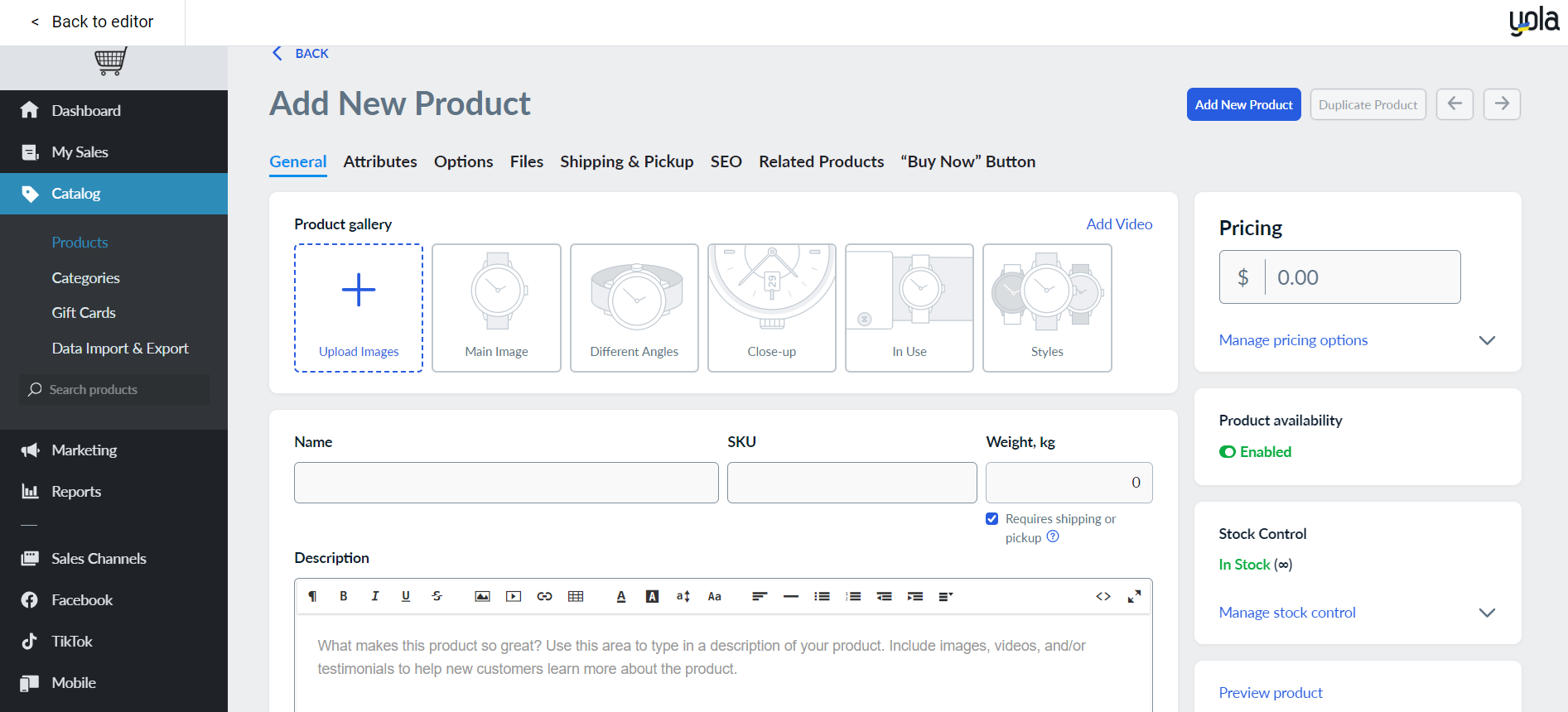
Ecommerce themes & templates
Yola offers a range of templates for building websites, including those suitable for ecommerce. However, the variety and design quality may not match those provided by other leading website builders. The templates are customizable, especially for users on higher-tier plans (Silver or Gold), which allow for deeper customization, including CSS editing.
Google Sites does not offer any ecommerce templates.
Product page customization
Yola’s ecommerce platform offers a variety of customization options for product pages, including the ability to manage product options and combinations. This feature is especially useful for selling items that come in different sizes, colors, or models, allowing customers to select their preferences directly from the product page.
Google Sites lacks any product page customization features. Products can be listed by embedding third-party platforms, and all customization can be done within those platforms.
Payment processing
Yola supports various payment gateways for online store transactions, such as PayPal, Sage Payments, and American Express, allowing users to choose based on their specific needs, including geographical availability and fee structure.
Google Sites does not have native payment features. Payment gateways can be integrated using external tools or links, by embedding HTML code for payment buttons from services like PayPal, Square, or Stripe, or by linking to an external checkout page. Third-party ecommerce widgets also offer a way to add payment functionalities. However, Google Sites doesn’t offer the comprehensive ecommerce capabilities that dedicated platforms provide.
Website Editors
Website EditorsEvaluates the platforms’ website building and editing capabilities.Score Components:
- Customization tools (40%): Range and power of editing features.
- Editor usability (30%): User experience within the editor.
- Design flexibility (20%): Freedom in layout and design changes.
- Update and maintenance ease (10%): Simplicity of updating and maintaining the site.
 7.0
7.0
 6.7
6.7
🏆
Winner: Google Sites
. Google Sites, with a score of 7.0, offers a user-friendly website builder editor that allows users to create and design websites without needing coding knowledge. With its drag-and-drop interface, users can easily add, customize, and arrange elements such as text, images, and videos on their web pages. It also provides a variety of templates and design options to help users get started quickly and ensure their site looks professional. Additionally, Google Sites integrates seamlessly with other Google services, enabling the incorporation of Google Docs, Sheets, Slides, and Maps directly into the website.
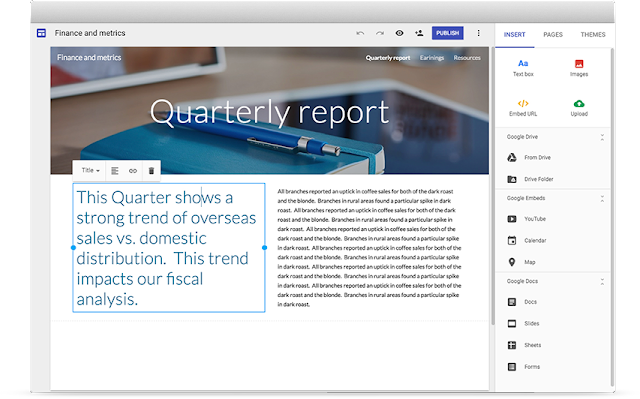
Yola’s website builder editor, scoring 6.7, is designed for ease of use, allowing users to create professional-looking websites without needing coding knowledge. It offers a drag-and-drop interface, enabling users to easily add, customize, and position elements like text, images, and buttons on their web pages. The editor also provides access to a wide range of templates and customization options, including color schemes, fonts, and page layouts, to help users achieve their desired website look and feel. Additionally, Yola supports responsive design, ensuring websites look great on both desktop and mobile devices.
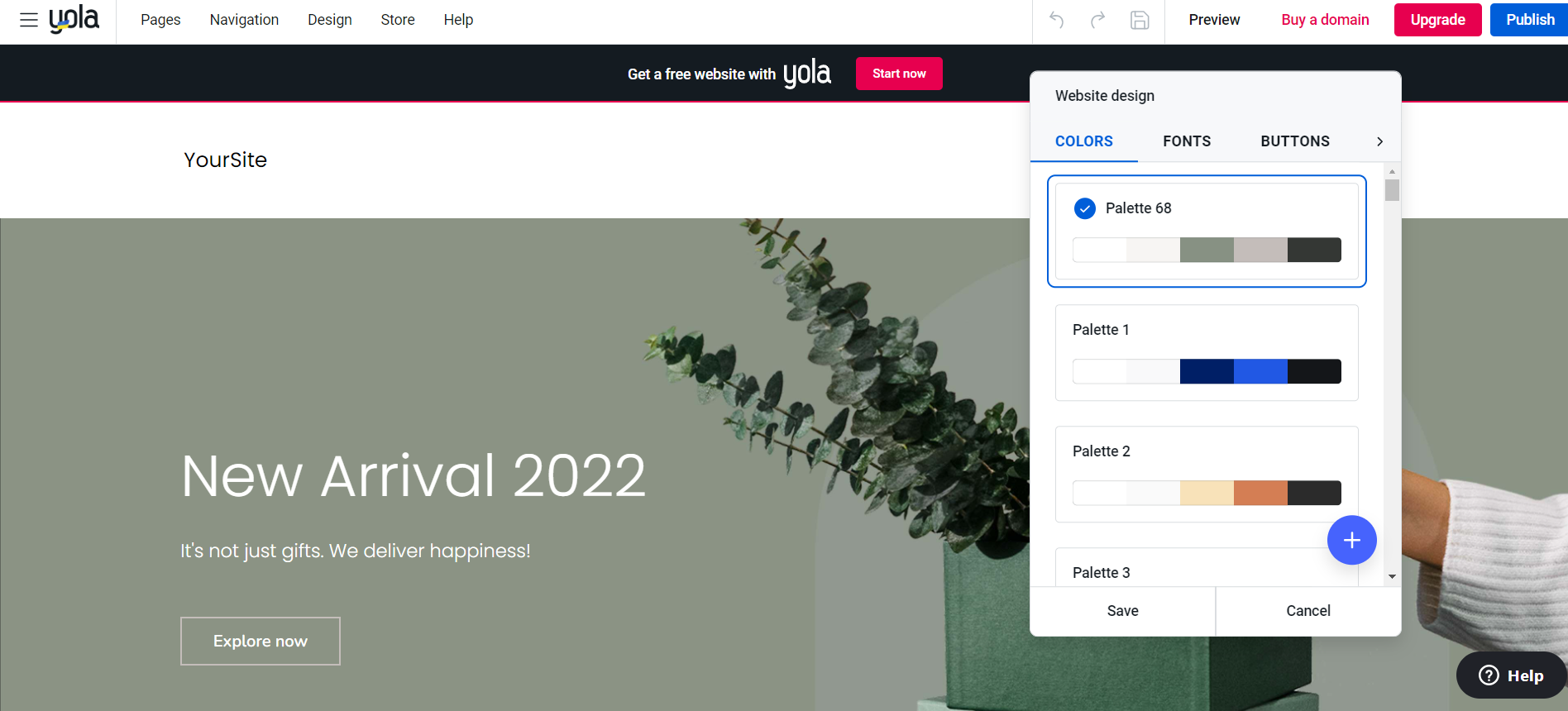
Mobile editor/app
 0
0
 4.5
4.5
🏆
Winner: Yola
. Neither Google Sites nor Yola offer a dedicated mobile editor app. However, Yola allows for some small changes to be made using a mobile browser, giving it a slight edge over Google Sites in this category. This feature can be beneficial for users who need to make quick updates or changes to their website while on the go.
Google Sites, on the other hand, does not provide any mobile editing capabilities, which can be a limitation for users who prefer to manage their website from a mobile device.
In summary, Yola receives a higher rating due to its ability to make some changes via a mobile browser, while Google Sites lacks any mobile editing capabilities.
Product testing options
Product Testing OptionsAssesses the options for trying out platform features before commitment.Score Components:
- Trial quality (40%): Extent and usefulness of the trial or free version.
- Feature accessibility (30%): How many features are available to test.
- Trial duration (20%): Length of the trial period.
- Ease of transition (10%): Smoothness of moving from trial to paid plans.
 6.9
6.9
 7.5
7.5
Overall Result
:
Yola wins
. Yola scores 7.5, slightly higher than Google Sites’ 6.9. Yola offers a 30-day refundable period during which premium features can be tested, while Google Sites allows for some premium features to be tested within a 14-day trial period.

|

|
|
|---|---|---|
|
Free Plan |
Yes | Yes |
|
Trial Duration |
14 days | No trial |
|
Testing Premium Features |
Some features during trial | During 30-day refundable period |
|
Money Back Guarantee |
No | 30-day money back guarantee |
Price
PriceLooks at the cost-effectiveness and value for money of each platform.Score Components:
- Plan value (40%): What each pricing tier offers.
- Transparency and clarity (30%): Clearness of pricing structures.
- Flexibility of plans (20%): Range of options to suit different budgets.
- Hidden costs (10%): Additional expenses not included in the plan.
 8.1
8.1
 8.1
8.1
Google Sites and Yola offer a similar range of pricing options, with Google Sites providing more advanced features for larger businesses and enterprises.

|

|
|
|---|---|---|
|
Free |
No offering at this amount. |
Free (Website) ($0/month): Basic features with Yola subdomain, suitable for starting a simple site. With possibility to have up to 2 websites and 2 page limit. Free (Online Store Add-on) ($0/month): Launch an online store with basic features and a limited number of products. Available as an add-on to a website plan. |
|
$0-$10 |
Business Starter ($7.20/month): This plan includes basic features suitable for individuals or small businesses, offering professional email through Gmail, 30GB of storage per user, and video meetings for up to 100 participants. It allows to manage 1 website and there is no limitation on number of pages. Value for price: 6.0 |
Bronze (Website) ($9.45/month): More resources and features, including unlimited pages and bandwidth. With possibility to have up to 5 websites. Value for price: 7.5 |
|
$10-$17 |
Business Standard ($14.40/month): Suitable for growing businesses, this plan provides 2 TB of storage per user, video meeting capacity for up to 150 participants with recording features, and access to smart booking pages and shared drives. It allows to manage 1 website and there is no limitation on number of pages. Value for price: 7.5 |
Basic (Online Store Add-on) ($15.00/month): Includes inventory tracking, order management, and the ability to sell on Facebook. Available as an add-on to a website plan. Value for price: 7.0 |
|
$15-$25 |
Business Plus ($21.60/month): Designed for larger businesses needing more robust capabilities, offering 5 TB of storage per user, advanced security options, and video meetings for up to 500 participants. It allows to manage 1 website and there is no limitation on number of pages. Value for price: 8.5 |
Silver (Website) ($18.95/month): Advanced design features and site customization options. With possibility to have up to 25 websites. Value for price: 8.0 |
|
$30-$35 |
No offering at this amount. |
Professional (Online Store Add-on) ($35.00/month): Advanced features including discount coupons, product filters, and sales on multiple platforms like Facebook and Instagram. Available as an add-on to a website plan. Value for price: 8.0 |
|
$35-$40 |
No offering at this amount. |
Gold (Website) ($35.45/month): Comprehensive plan with unlimited storage and advanced SEO tools. With possibility to have up to 25 websites. Value for price: 8.5 |
|
$90+ |
No offering at this amount. |
Unlimited (Online Store Add-on) ($99.00/month): The most extensive plan offering a vast product catalog, point of sale integrations, and more, for expanding online business. Available as an add-on to a website plan. Value for Price: 9.0 |
location. As a result in rare cases the prices displayed here can differ from the ones you see on their
websites.
Hosting quality
Hosting
qualityExamines the reliability and performance of the hosting solutions.Score Components:
- Uptime (40%): Consistency and reliability of website availability.
- Speed (30%): Loading times and performance.
- Bandwidth and storage (20%): Sufficiency of resources provided.
- Data centers (10%): Quality and distribution of hosting infrastructure.
 8.2
8.2
 7.2
7.2
🏆
Winner: Google Sites
Google Sites and Yola both offer reliable hosting with a 99.9% uptime guarantee. However, Google Sites edges out with its extensive network of 21 global data centers and integration with Google Workspace, providing a more robust and scalable hosting solution. Yola, on the other hand, offers a more straightforward hosting solution with automatic and manual backup options, making it a good choice for small businesses and individuals.

|

|
|
|---|---|---|
|
Do they offer hosting? |
Yes, included in all plans |
Yes, included in all plans |
|
Data Centers: |
Google operates a total of 21 data centers across the globe: 2 in Asia, 5 in Europe, 13 in US and 1 in South America |
5 data centers located in US and EU |
|
Type of hosting: |
Cloud based managed hosting |
Managed Cloud Hosting |
|
Uptime: |
99.9% |
99.9% |
|
Uptime Guarantee: |
Yes, 99.9% |
Yes, 99.9% |
Website Speed Optimization
Website Speed OptimizationEvaluates optimization of website loading timesScore Components:
- PageSpeed Score (30%): Google’s score indicating performance optimization.
- Loading Time (30%): The average time until a website is fully interactive.
- Mobile Optimization (15%): Optimization effectiveness for mobile devices.
- Resource Optimization (15%): Optimizing images, scripts, and other heavy resources.
- CDN Usage (10%): Use of CDN to enhance speed across geolocations.
 3.3
3.3
 7.5
7.5
🏆 Winner: Yola
Both Google Sites and Yola place a high priority on website performance and page speed, with Google Sites focusing on automated optimization, CDN, mobile optimization, browser caching, code minification, and use of AMP, and Yola emphasizing CDN, caching, code minification, server response time improvements, and image optimization. However, Yola gets the edge when it comes to website speed optimization.

|

|
|
|---|---|---|
|
Focus |
Automated Optimization, CDN, Mobile Optimization, Browser Caching, Code Minification, Use of AMP |
CDN, Caching, Code Minifcation, Server response time improvements, Image optimization |
|
Performance Tools |
Google Lighthouse, PageSpeed Insights |
Google PageSpeed Insights Integration |
|
Key Strategies |
Automated Optimization, CDN, Mobile Optimization, Browser Caching, Code Minification, Use of AMP |
CDN, Caching, Code Minifcation, Server response time improvements, Image optimization |
|
Load Times |
Google does not disclose statistics about website Page Speed scores, or load times |
Both load times and Page speed scores varies widely, depending on the optimization, website complexity |
|
Page Speed Scores Range |
Google does not disclose statistics about website Page Speed scores, or load times |
Both load times and Page speed scores varies widely, depending on the optimization, website complexity |
|
Core Web Vitals Improvement |
Emphasis on LCP, FID, CLS improvements |
Emphasis on LCP, FID, CLS improvements |
Yola, like Google Sites, places a strong emphasis on website performance and page speed. Yola’s approach to enhancing site speed includes CDN, caching, code minification, server response time improvements, and image optimization. This approach leverages Yola’s fast servers and CDN network to boost load speed. Yola also suggests utilizing Google AMP for faster mobile page loads, although with some design compromises. Analysis of three Yola sites showed a range of Yola speed scores from 14 to 75, Google PSI scores from 8 to 80, and load times varying from 10.6 seconds to 2.3 seconds. Continuous maintenance and optimization are essential for keeping Yola stores fast.
Google Sites, on the other hand, does not disclose statistics about website Page Speed scores, or load times. However, it places a strong emphasis on automated optimization, CDN, mobile optimization, browser caching, code minification, and use of AMP. Google Sites also emphasizes on LCP, FID, CLS improvements for Core Web Vitals.
Get a head start on website creation with AI
Create a custom website tailored to your business needs 10X faster with 10Web AI Website Builder!
Plugins and integrations
Plugins and integrationsMeasures the range and effectiveness of additional plugins and integrations.Score Components:
- Variety of options (40%): Range of available add-ons.
- Integration smoothness (30%): Ease of integrating plugins into the site.
- Quality of plugins (20%): Functionality and reliability of the options.
- Custom integration capabilities (10%): Support for custom or third-party integrations.
 6.4
6.4
 6.3
6.3
🏆 Winner: Google Sites.
Google Sites scores 6.4, slightly ahead of Yola’s 6.3. Both platforms offer a wide array of plugins and extensions to enhance website functionality, catering to various needs such as social media integration, e-commerce, chats, forms, video, audio, and more. However, Google Sites edges out with its integrations like Elfsight and Common Ninja that extend its basic functionalities to include features like social media feeds, review displays, chat support, e-commerce tools, and various interactive widgets. These integrations are designed to enhance user engagement, improve website functionality, and boost sales, making Google Sites a more powerful platform for businesses, educators, and individuals. Both platforms provide easy-to-use, customizable widgets that require no coding knowledge, ensuring that users can significantly enhance their Google Sites without technical difficulties.

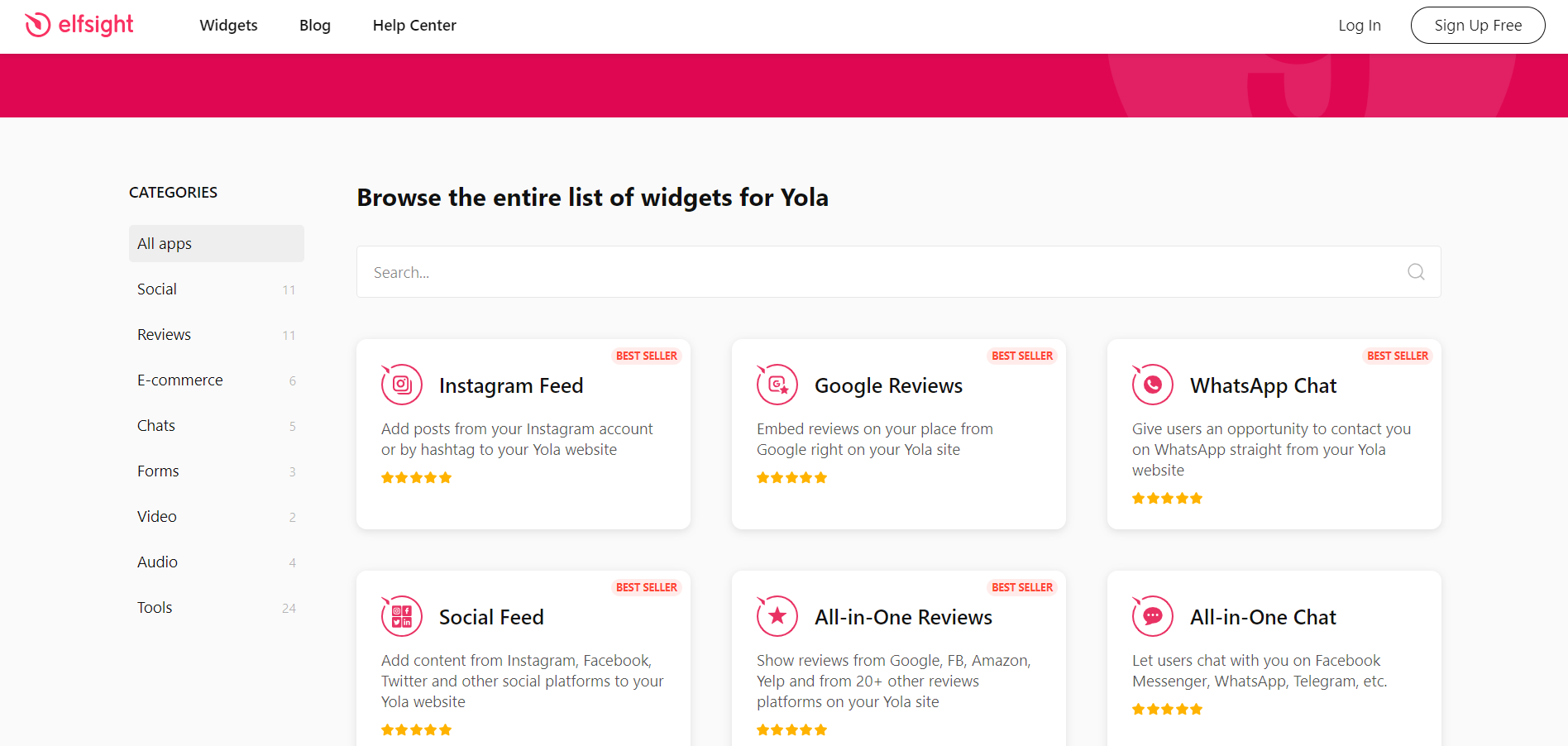
Marketing Features
Design FunctionalitiesRepresents how well each platform allows for creative design and customization of websites.Score Components:
- Template Variety (30%): Range and quality of design templates.
- Customization (30%): Flexibility and options for design alterations.
- User Interface (20%): Ease and intuitiveness of the design process.
- Responsiveness (10%): Adaptability to different devices and screen sizes.
- Innovation (10%): Unique design features and tools.
 2.6
2.6
 6.5
6.5
🏆
Overall Winner: Yola
. Yola stands out for its more comprehensive marketing tools, especially in email marketing, blogging, and ads and promotions. Google Sites, while offering basic SEO and analytics features, lacks in email marketing and blogging capabilities.

|

|
|
|---|---|---|
|
SEO Tools |
Basic SEO settings | Basic built in SEO tools, with possibility of more advanced third party integrations |
|
Email Marketing |
No | Yes, available on higher plans, as well as possibility to integrate Mailchimp Email marketing |
|
Blogging |
No | Yes |
|
Social Media Integration |
Yes, you can easily embed social media links and widgets into a Google Site. | Yes |
|
Analytics and Reporting |
Yes, Google Analytics integration | Yes, possibility to integrate Google Analytics |
|
Ads and Promotions |
No | Yes, on higher plans |
Customer Support
Customer supportEvaluates the quality and availability of support options.Score Components:
- Response time (40%): Speed of support responses.
- Support quality (30%): Effectiveness and helpfulness of the support.
- Availability (20%): Range of support channels (phone, chat, email).
- Resource richness (10%): Quality of self-help and educational materials.
 7.2
7.2
 6.3
6.3
🏆 Winner: Google Sites
. In the comparison of Google Sites vs Yola, Google Sites takes the lead with a customer support score of 7.2. Google Sites offers a range of support options, including a Help Center, community forums, and direct support for Google Workspace customers. Paid subscribers benefit from 24/7 support for critical issues, making it a reliable choice for users who need consistent and comprehensive assistance.
Yola, with a customer support score of 6.3, provides 24/7 email support and prioritizes responses for paid plan subscribers. While Yola offers a call-you-back service and support via social media, it lacks the extensive direct support options available to Google Sites users. Despite this, Yola’s support is still commendable for its responsiveness and availability, particularly for small businesses and individual users.
Security
SecurityLooks at the platforms’ security measures and data protection.Score Components:
- Data protection (40%): Safeguards for user and customer data.
- SSL and encryption (30%): Implementation of secure connections.
- Compliance (20%): Adherence to industry security standards.
- Regular updates (10%): Frequency of security updates and patches.
 9.3
9.3
 8.3
8.3
🏆
Winner: Google Sites
. Google Sites, with a security score of 9.3, offers robust security measures including SSL encryption, two-factor authentication, automatic malware scanning, and compliance with international data protection standards. It also benefits from Google’s regular security updates and infrastructure that offers DDoS protection and data redundancy.
Yola, scoring 8.3 in security, also provides strong security features such as SSL encryption, DDoS mitigation, firewalls, regular software updates, and data backup and recovery. However, it falls slightly short when compared to the comprehensive security measures provided by Google Sites.
AI Capabilities
AI capabilitiesMeasures the effectiveness of AI-driven features and tools.Score Components:
- Automation efficiency (40%): Impact of AI on streamlining processes.
- Personalization (30%): AI-driven customization for users or customers.
- AI-Assisted design (20%): Role of AI in website design and functionality.
- Data analysis (10%): Use of AI in interpreting user data and analytics.
 0
0
 0.0
0.0

|

|
|
|---|---|---|
|
AI Builder |
|
|
|
AI Ecommerce features |
|
|
|
AI Content Generation |
|
|
|
Additional AI features |
|
|
🏆 Winner: Tie
. Neither Google Sites nor Yola offer AI capabilities in their website builders. Both platforms focus on providing a user-friendly interface for creating and managing websites, but do not incorporate AI tools or features. This lack of AI capabilities may limit the automation and personalization options available to users.
User Management
User ManagementAssesses the platforms’ capabilities in managing user roles, permissions, and accessibility.Score Components:
- Role Customization (40%): Flexibility in creating and defining user roles and
permissions. - Ease of Management (30%): User interface and tools for managing users.
- Access Control (20%): Effectiveness of access control measures for different user
levels. - Scalability (10%): Ability to manage a growing number of users efficiently.
 7.8
7.8
 7.3
7.3
🏆 Winner: Google Sites
. Both Google Sites and Yola offer multi-user editing capabilities, allowing different levels of access and control based on the plan chosen. However, Google Sites has a slight edge due to its flexibility in management and development.
- Google Sites allows multiple users to collaborate with different roles, including Owners, who have full control, and Editors, who can modify content but not site settings. There’s no strict limit on the number of users who can edit a site. Viewers can only see the site, with no editing permissions. This structure supports collaborative website building with varied levels of access and control for different users.
- Yola supports multi-user editing capabilities, allowing different levels of access and control based on the plan chosen. The primary account holder, often referred to as the Owner or Administrator, possesses comprehensive control over the website, including the ability to edit content, manage settings, and extend invitations to collaborators for website modification. Collaborators or Editors, invited by the account holder, can edit the website to varying degrees, which might range from content editing to page management, depending on the permissions granted by Yola’s platform. The number of users permitted to edit a website and the scope of their roles and permissions may vary, typically increasing with higher-tier subscription plans.
Additional Features

|

|
|
|---|---|---|
|
SSL Certificate |
|
|
|
Custom Domain |
|
|
|
Free Custom Domain Included |
|
|
|
International Domains |
|
|
|
Mobile Responsive |
|
|
|
Page Speed |
|
|
|
Website Builder Mobile App |
|
|
|
Convert a Website To An App |
|
|
|
Website Analytics |
|
|
|
Multilingual Sites |
|
|
|
Multiple Users |
|
|
User Feedback
Users consistently praise Google Workspace, particularly Google Sites, for its seamless integration, ease of use, and collaborative features, making it a go-to solution for various professional and educational needs. The platform’s simplicity and user-friendly interface are lauded, enabling effortless website creation and sharing of information within organizations. While some users desire more customization options and additional features, overall, Google Workspace remains highly valued for its versatility and streamlined workflow facilitation.
Yola seems to have received mostly positive reviews. Users appreciate its professional templates, ease of use, affordability, and customer service. They find it ideal for website creation, especially for those without specialized knowledge. However, some users express dissatisfaction with aspects such as data security, customization limitations, and lack of certain features like chat support. Overall, Yola appears to solve the problem of easy website creation and maintenance for businesses and individuals, offering a range of templates and tools at a reasonable price point.
The making of this blog
We followed a clear, step-by-step process to write and research this article.
FAQ
Which platform is better for beginners, Google Sites or Yola?
Can I use both Google Sites and Yola for ecommerce?
How do Google Sites and Yola differ in terms of customization and design flexibility?
What are the major differences in pricing and value between Google Sites and Yola?
Which platform offers better website speed optimization, Google Sites or Yola?











